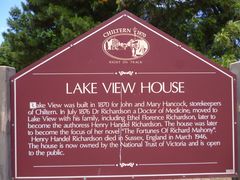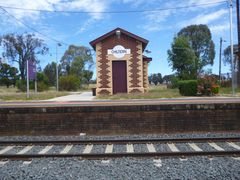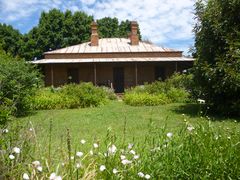
'An afternoon at the lake house'
 Photo: Kerrin O'Sullivan
Photo: Kerrin O'Sullivan
 Photo: Kerrin O'Sullivan
Photo: Kerrin O'Sullivan
 Photo: Kerrin O'Sullivan
Photo: Kerrin O'Sullivan
The Weekend Australian
14 Jan 2012
It feels a little eerie, as if I'm looking through the great author's eyes, indeed through time itself.
The french windows of Henry Handel Richardson's one-time childhood home, Lake View House, have been flung open and the glorious northeast Victorian sunshine floods in. From the shady veranda, I have an unimpeded view of the lake; its island, created from an old mullock heap, prompts memories of Chiltern's goldmining heritage.
Lake View House became the home of Ethel (Ettie) Florence Richardson, better known by her pseudonym Henry Handel Richardson, after her doctor father moved the family to Chiltern in 1876.
Now owned by the National Trust of Victoria, this house became the centrepiece of the classic The Fortunes of Richard Mahony, her most important work. Chiltern was rural Barambogie in the trilogy and the lake I'm admiring was the swamp in Ultima Thule.
Acclaimed as one of Australia's greatest novelists, Richardson achieved early recognition overseas and was translated into several European languages. During her two childhood years in Chiltern, she absorbed impressions of the Australian countryside that were to flavour her writings: the "stillness of the bush", "gentian-blue skies" and "sunlight and space". At Lake View, Richardson recalled in Myself When Young, she invented stories while bouncing a ball against the "liver-red brickwork", finding in the veranda's shadows "a sense of freedom".
A wander through the homestead finds it furnished in period style, with a collection of Richardson memorabilia. A piano reminds that young Ettie excelled in playing and singing, later undertaking musical studies in Leipzig. Exhibited are numerous scores she composed, including Tryste Noel. Despite successes, some say her musical ambitions outshone her capacity. Around Chiltern however, six-year old Ettie and sister Lil, 'the Doctor's little girls', were regarded as musical prodigies, and in high demand.
Following the Murray red gum hallway, I discover mementos of her life and work. An ouija board recalls Richardson's father's interest in séances and spiritualism; a cabinet of vintage medical instruments the legacy of the practice he conducted from the front room known as 'the Surgery'. Bookcases display copies of Richardson's published novels; film rights for dramatisation of her books, and references to her boarding education at Presbyterian Ladies College, Melbourne. A reproduction of the famous oil-on-canvas Rupert Bunny portrait of the writer graces one wall.
It is the simple Victorian writing desk, however, that catches my eye. This desk accompanied Richardson on her many moves between England and Europe, and it is here that she is said to have written Maurice Guest and The Getting of Wisdom.
The afternoon's warmth has me seeking the shadowy cool of Lake View's gardens where Ettie played amongst the roses and apricot trees. Alongside the "sweltering" summer heat, Richardson wrote that her enduring impression of Chiltern was of colour and scent - the blossoming wattles beyond the town, their honey fragrance.
When Henry Handel Richardson died in England, her ashes were scattered in the English Channel; Lake View exists as the only memorial. Each year on January 3, the homestead's grounds host a birthday celebration with guest speakers and readings commemorating her life's work, plus a rousing round of "Happy Birthday HHR" complete with cake.
Goldfields-era Chiltern boasts antiques, bric-a-brac, a museum and the 1866 Star Hotel and Theatre; in fact, 22 properties are registered by the National Trust. With Richardson's novels still on school and university reading lists, Australia's own "HHR" lives on in her writings.
As I leave Lake View a coppery sun sinks and the shadows deepen to "purple-blue", just as she described them.
© 2012 Kerrin O’Sullivan
An evocative visit to Henry Handel Richardson's childhood home in northeast Victoria by Kerrin O'Sullivan
It feels a little eerie, as if I'm looking through the great author's eyes, indeed through time itself.
The french windows of Henry Handel Richardson's one-time childhood home, Lake View House, have been flung open and the glorious northeast Victorian sunshine floods in. From the shady veranda, I have an unimpeded view of the lake; its island, created from an old mullock heap, prompts memories of Chiltern's goldmining heritage.
Lake View House became the home of Ethel (Ettie) Florence Richardson, better known by her pseudonym Henry Handel Richardson, after her doctor father moved the family to Chiltern in 1876.
Now owned by the National Trust of Victoria, this house became the centrepiece of the classic The Fortunes of Richard Mahony, her most important work. Chiltern was rural Barambogie in the trilogy and the lake I'm admiring was the swamp in Ultima Thule.
Acclaimed as one of Australia's greatest novelists, Richardson achieved early recognition overseas and was translated into several European languages. During her two childhood years in Chiltern, she absorbed impressions of the Australian countryside that were to flavour her writings: the "stillness of the bush", "gentian-blue skies" and "sunlight and space". At Lake View, Richardson recalled in Myself When Young, she invented stories while bouncing a ball against the "liver-red brickwork", finding in the veranda's shadows "a sense of freedom".
A wander through the homestead finds it furnished in period style, with a collection of Richardson memorabilia. A piano reminds that young Ettie excelled in playing and singing, later undertaking musical studies in Leipzig. Exhibited are numerous scores she composed, including Tryste Noel. Despite successes, some say her musical ambitions outshone her capacity. Around Chiltern however, six-year old Ettie and sister Lil, 'the Doctor's little girls', were regarded as musical prodigies, and in high demand.
Following the Murray red gum hallway, I discover mementos of her life and work. An ouija board recalls Richardson's father's interest in séances and spiritualism; a cabinet of vintage medical instruments the legacy of the practice he conducted from the front room known as 'the Surgery'. Bookcases display copies of Richardson's published novels; film rights for dramatisation of her books, and references to her boarding education at Presbyterian Ladies College, Melbourne. A reproduction of the famous oil-on-canvas Rupert Bunny portrait of the writer graces one wall.
It is the simple Victorian writing desk, however, that catches my eye. This desk accompanied Richardson on her many moves between England and Europe, and it is here that she is said to have written Maurice Guest and The Getting of Wisdom.
The afternoon's warmth has me seeking the shadowy cool of Lake View's gardens where Ettie played amongst the roses and apricot trees. Alongside the "sweltering" summer heat, Richardson wrote that her enduring impression of Chiltern was of colour and scent - the blossoming wattles beyond the town, their honey fragrance.
When Henry Handel Richardson died in England, her ashes were scattered in the English Channel; Lake View exists as the only memorial. Each year on January 3, the homestead's grounds host a birthday celebration with guest speakers and readings commemorating her life's work, plus a rousing round of "Happy Birthday HHR" complete with cake.
Goldfields-era Chiltern boasts antiques, bric-a-brac, a museum and the 1866 Star Hotel and Theatre; in fact, 22 properties are registered by the National Trust. With Richardson's novels still on school and university reading lists, Australia's own "HHR" lives on in her writings.
As I leave Lake View a coppery sun sinks and the shadows deepen to "purple-blue", just as she described them.
© 2012 Kerrin O’Sullivan